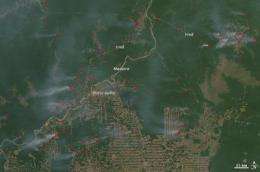Sea change can forecast South American wildfires

Tiny temperature changes on the Atlantic and Pacific oceans provide an excellent way to forecast wildfires in South American rainforests, according to UC Irvine and other researchers funded by NASA.
"It enables us three to five months in advance to predict the severity of the fire season," said UCI assistant project scientist Yang Chen, lead author of a paper that will be published Friday, Nov. 11, in the journal Science.
Wildfires, once rare in tropical forests, have become a major threat to humans and biodiversity across an "arc of deforestation" in Brazil, Bolivia and Peru due to clear-cutting and agricultural burns. The study's authors said the new findings could aid fire and public health officials, planners issuing burn permits, and broader efforts to stem climate change. Rainforests are vital carbon dioxide storage basins, and woodlands consumed by fire across the southern continent are responsible for about a quarter of the greenhouse gases released from forests globally.
"This work has very clear implications for conserving tropical forests," said co-author James Randerson, UCI Earth system science professor. "During the 21st century, there are expectations that drought may intensify, and forests may become even more vulnerable. Understanding in advance whether you're going to have an exceptionally bad year will become critically important for managing them."
The prediction method is similar to that for storms. Just as sea surface temperatures can be harbingers of powerful Atlantic hurricanes or El Nino conditions that influence rainfall in California and elsewhere on the Pacific Rim, they can be used to model drought-inducing atmospheric changes. Utilizing archival satellite data from NASA, Chen and fellow scientists painstakingly plotted a decade of water temperature variations and wildfire duration and intensity across central South America.
They found that temperature increases of as little as a quarter of a degree Celsius on the Atlantic and a single degree on the Pacific matched up with more deadly blazes across broad swaths of the Amazon over the next year.
"These changes are slight, but they trigger big effects in these tropical forest ecosystems," Chen said. Ocean temperatures affect atmospheric winds and clouds that can reduce or increase rainfall over the continent.
The scientists tested their theory by forecasting – based on water temperature readings – South America's 2010 fire season and then checking actual data afterward. Their accuracy was striking. Last year saw the biggest temperature increases on both oceans and, several months later, far drier conditions on land.
"We predicted a massive spike in fires in 2010, and it occurred," said Randerson, citing conflagrations across hundreds of miles. In one state, they had forecast worse fires than occurred, then learned later that officials there had sharply reduced clear-cutting the year before. Overall, while deforestation has declined in the past decade, wildfires have not because of prescribed farming burns that escape into nearby woods.
The scientists are compiling data for the 2012 fire season and plan to release their findings this winter for officials to use next year. The next step will be to see if the prediction method works for forests in Siberia, Indonesia and West Africa.
Provided by University of California - Irvine
















